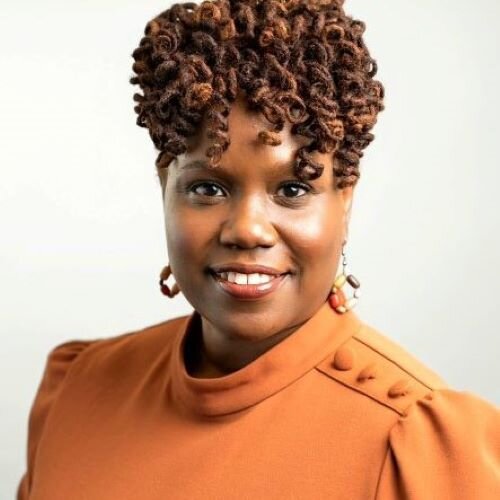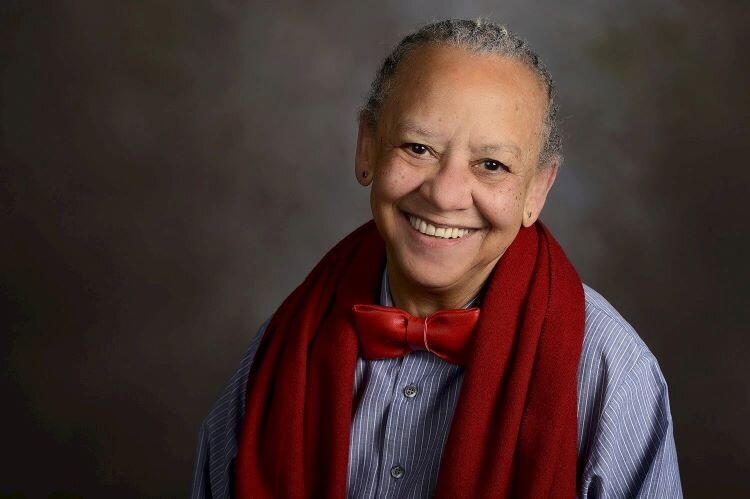Reflecting on life, legacy of Nikki Giovanni
The late poet, writer, and activist Nikki Giovanni had a profound influence on art, culture, and society and a very personal impact on USF Professor of Communication Aisha Durham.
Nikki Giovanni, the world-renowned Black American poet, spoke truth to power way before the words were strewn together to enter the vernacular. Inspiring, iconic, and a trailblazer, she passed away on December 9th, 2024 in Blacksburg, Va., at 81.
Born on June 7, 1943, in Knoxville, Tenn., Giovanni was not one to mince words. She was one of the most vocal voices of the Black movement of the ’60s and ’70s and had the courage to address her own community when needed. Her memorable conversation with the famous Black writer James Baldwin in a 1971 episode of the television program “Soul!” (available here on YouTube) reveals an articulate, call-it-like-it-is young woman of 28 who knows what to say and how to say it:
“Because I love you, I get least of you. I get the very minimum. And I’m saying, you know, fake it with me! Is that too much for the Black woman to ask of the Black man?”
She received numerous awards for her work, including the Langston Hughes Medal and seven NAACP Image Awards. Her poetry album, “The Nikki Giovanni Poetry Collection,” was nominated for a Grammy.
University of South Florida Professor of Communication Aisha Durham recalls how her father, who was also part of the Black Arts Movement, introduced Giovanni’s poetry to her as a child to support her dreams of becoming a writer.
“But it was my mother who met Giovanni around 1994,” Durham says. “She made the five-hour trek from Norfolk to Blacksburg to visit my cousin’s college professor at Virginia Tech. My mother boldly boasted, ‘My daughter writes poetry too.’ When my mother came home, she said Giovanni wanted to read my work. I was ecstatic.
My cousin hand-delivered three poems. When she came back to Norfolk, I was handed an autographed book with a beautiful letter about my poems.”
That letter has remained a cherished memento.
“I received Giovanni’s letter in high school,” she says I have carried that letter and the book with me from the cinderblock walls of my childhood public housing apartment to the framed halls of the University of South Florida where I teach ethnography using poetry. Her response nurtured me as a budding writer. I had the support of my parents and my local community, and now Nikki Giovanni…Well, I felt almost led to pen stories of Black life similar to Giovanni.”
Durham says the poet, activist, and icon helped shape her as a writer.

“She is a poet for the people,” she says. “Her work is invested in exploring the evocative and the emotive aspects of Black life across generations. From her, I use words—whole body, full-of-life words—to paint pictures, to draw people into stories that invite us to feel and think about how we see each other.”
A published author herself, Durham writes in a genre called performance autoethnography, which uses poetry to stage interactions between people to offer critical insight about culture and identity. Her poetry has been featured in the journal “Qualitative Inquiry” and she’s authored a book, “Home with Hip Hop Feminism: Performances in Communication and Culture,” about her Virginia home.
“I can point to popular poems, such as ‘Nikki Rosa,’” Durham says. “That said, her subject matter is as expansive as Black life, so there are go-to poems that I re-read about poetry (e.g., ‘Poetry’), political love, communing with nature, and Black beauty.”
Sometimes, the same poem takes on a different meaning over time.
“A poem like “Nikki Rosa” reads differently as an adult. Like Giovanni, I recall having a happy childhood in a loving community despite local news reports documenting my housing project as riddled with crime. In my book, “Home with Hip Hop Feminism,” I take newspaper headlines to create a poem to poetically talk back to reporters who knew little about Black life in my Diggs Park public housing community.”
For Durham, it’s hard to overstate Giovanni’s influence and impact.
“I am indebted to her,” she says. “Her small act of seeing me then has shaped me as a writer today.”
Giovanni also dreamt of going to space. “Going To Mars: The Nikki Giovanni Project,” an award-winning HBO documentary released last year, explores her work and influences. Although she has passed away, her words will stay with us forever:
BLK History Month
If Black History Month is not
viable then wind does not
carry the seeds and drop them
on fertile ground
rain does not
dampen the land
and encourage the seeds
to root
sun does not
warm the earth
and kiss the seedlings
and tell them plain:
You’re As Good As Anybody Else
You’ve Got A Place Here, Too
For more information, go to Nikki Giovanni and Aisha Durham













